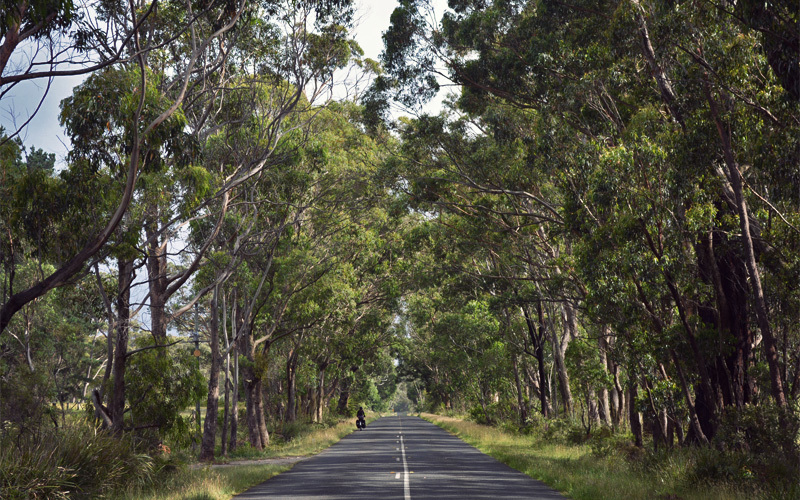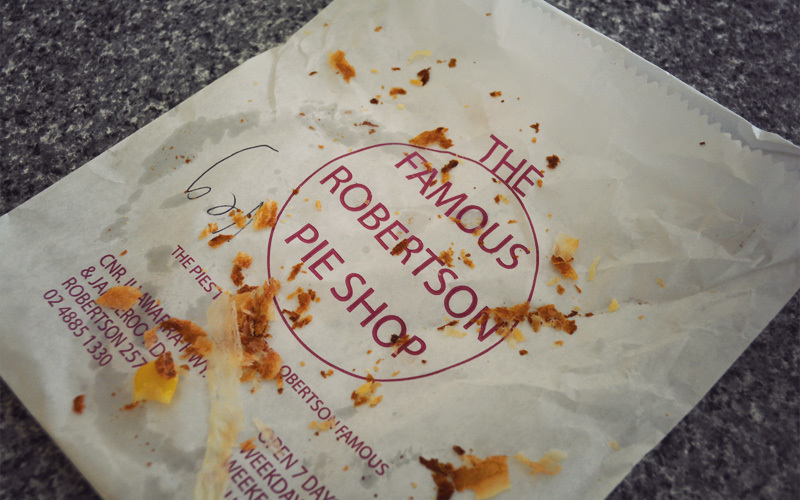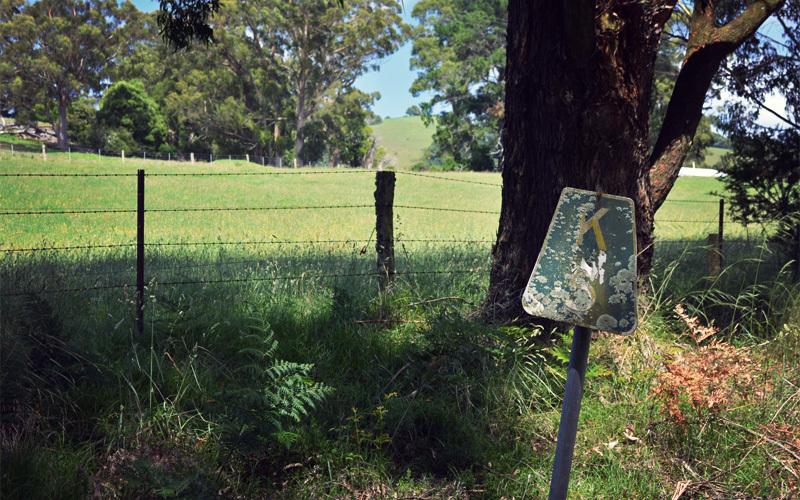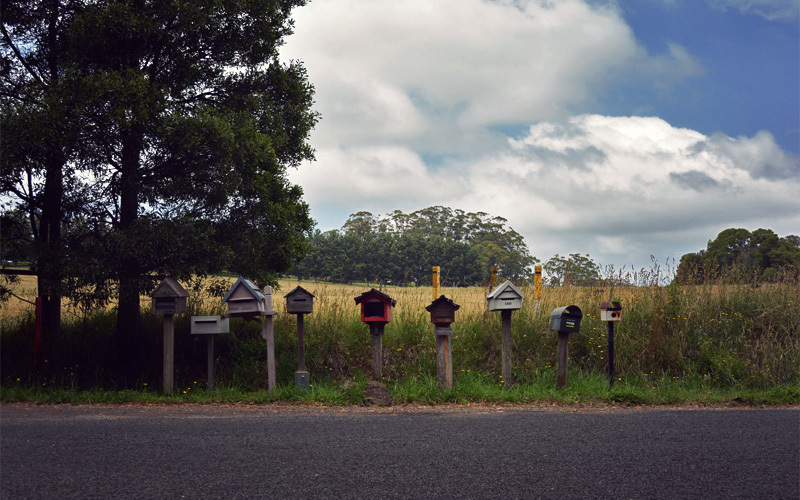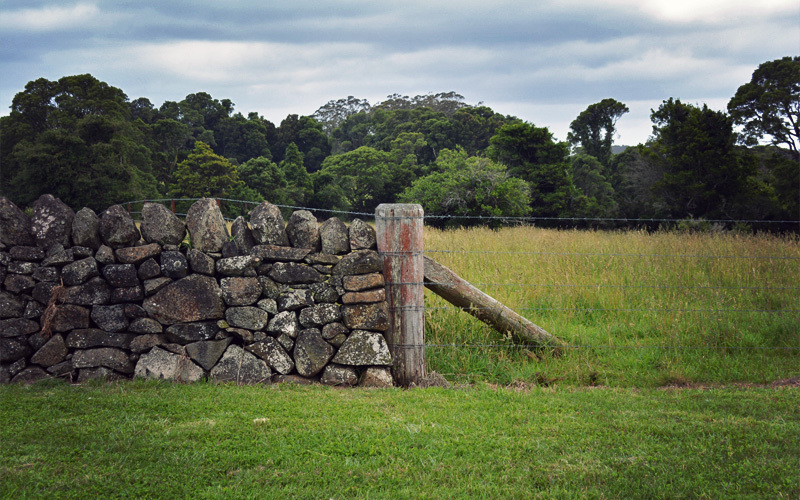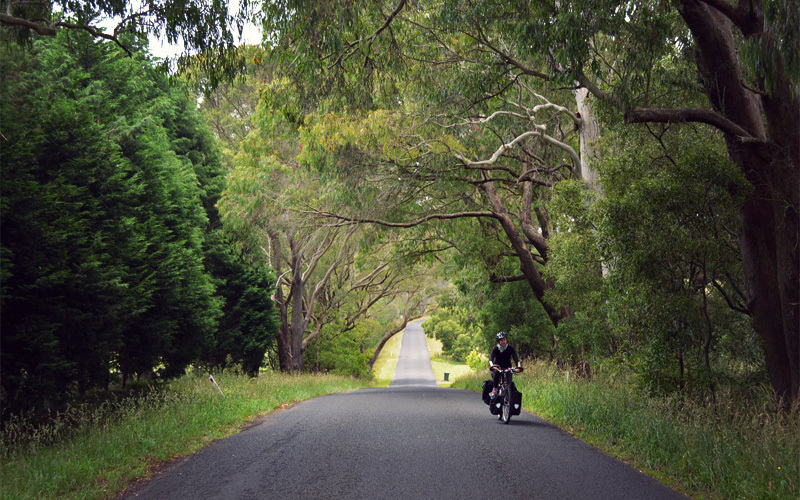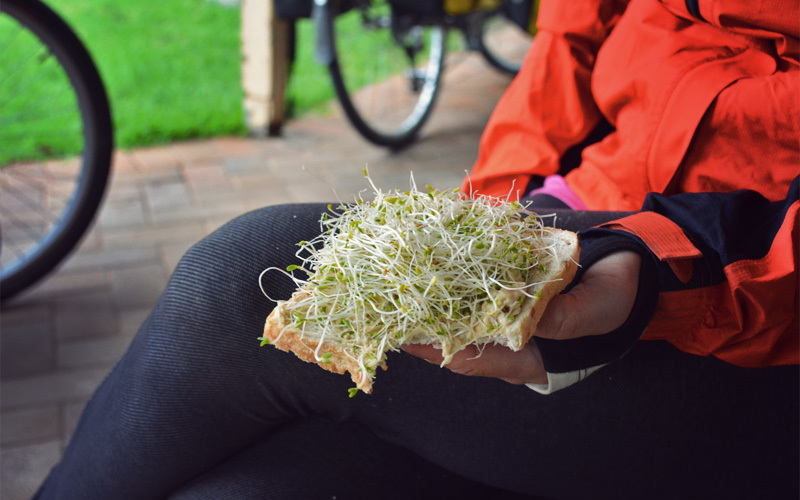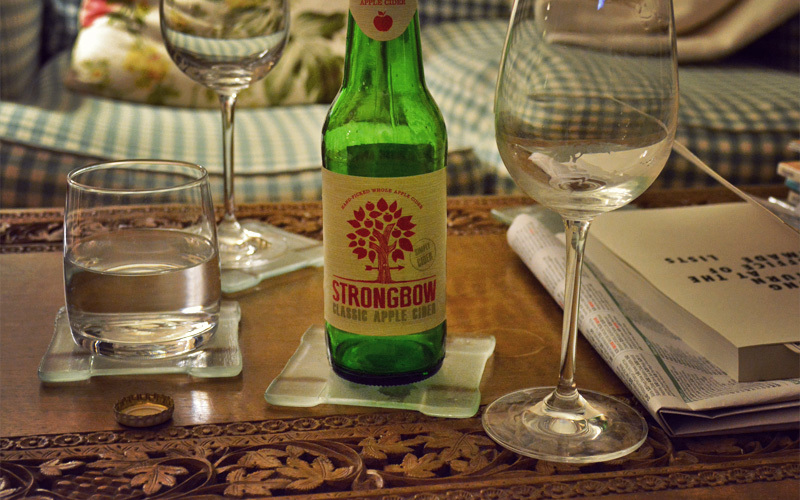December 17, 2014
Day 113: Barren Grounds Nature Reserve to Bundanoon, NSW
We hear only two cars pass all night on the paved road that runs more than a mile from the picnic area where we set up our tent. It remains silent until some time around 2:30 in the morning, when heavy winds appear as if from nothing and make the trees around us swish and hiss and creak until we wake up four hours later. We return to the road under the overcast blown onshore by the wind, which lets us climb over the short but steep hills under a cover of cool. Soon we pass from the nature preserve into a national park, and the trees and birds and quiet that surrounded us throughout last night's climb continue this morning.

| Heart | 1 | Comment | 0 | Link |
When the speed limit sign turns over to 100, it signals the end of the hard cranking and the start of a gentle downhill that takes us most of the way to Robertson. We fly down in our big chain rings under cloud cover, but we simply feel good, not cold with frozen ear lobes and fingertips and toes as we did in almost every situation like this in New Zealand. For the last run into town we hang a left on the highway. It reminds me of cycling on highways back home in America, because it has wide shoulders covered in a palette of bits of brown and green and clear glass that have come from the shattering of beer bottles tossed out of the passenger-side window of speeding trucks.
The highway takes us through the main street of Robertson. It's the kind of small town where signs announce the weekend country market and the old-time partner dances at the Masonic temple, and where people walk so slow that some of them will have forgotten where it was they were headed before they get there. Near the end of town we can't decide whether to take the scenic side road that starts by heading up a steep hill or the highway that runs straight and flat out toward the west, so we flip a coin. Heads is the highway, tails is the back road, and heads comes out the winner. We start riding in that direction, but beyond the train tracks the glorious American-style shoulder disappears. It's late enough in the morning that the truck traffic has picked up, so we make the decision to pull a u-turn, head over a stream on a creaking wooden bridge, and get to cranking up the hills of the back road.
It turns out to be the way we should have gone all along. Thick lines of trees and bushes run up to the edge of the pavement and sometimes over it. It's the kind of out of the way road where there's no center line and it's wide enough for two cars to pass each other at the same time, but only if they slow down. It sends us past small dairy farms, century-old cemeteries filled with ornate and weathered headstones, and fences made of stone that were probably built by the same people whose bones now rest six feet below the surface of the ground on which those headstones rest. Orange-yellow butterflies dance in pairs just above the tall grass that parallels the barbed wire fence lines as we pedal over long and steep climbs that are followed at once by long and steep descents down to creek and stream crossings.
Climbing hills is tough work, because climbing hills is always tough work, no matter how long you've been riding, how much food you eat, or how much stronger your legs appear to have become. But it's made miserable on this stretch by the clouds of flies that are literally everywhere. Whenever Kristen rides in front of me I can look up and see at least ten flies sitting on her back, another half dozen buzzing around her face, and several more that hitch a ride by hanging on to the back of the sleeping bag stuff sack. The ones near the face are what drive us toward a roadside mental breakdown, because at best they land on our cheeks and chins and ear lobes, but most of the time they fly straight into our eyes or ears or up a nostril. And no matter how much we swat or swear or try to blow them away, they stick around; never biting, just waiting. It's like the flies think we'll either decompose or turn into a piece of cow poop in the next five minutes, and once that happens, man, life is going to be so good.
Along the highway to Moss Vale we pass by the grounds of a boarding school named Tudor House. That a boarding school exists out in these rolling country hills isn't that surprising, but what gets me is the line at the bottom of the sign out front that reads "K through 6." I can't believe it. It's one thing to send away a teenager to live far from home for most of the year, but it's almost impossible to imagine the kind of thought process that ends with a parent sitting down their five-year-old son and telling them to pack up, ship out, and get used to living with a bunch of strangers. It was tough enough for me to handle such a thing when I moved into a dorm room at the University of Washington at age eighteen. To have to do that as a kid, and to have it forced on you by the people who are supposed to love you, protect you, and be there to support you — well, just the thought of how little Jeff would have felt in that kind of situation makes me horribly sad. Then I wonder about the parents who make that choice and think, why have a child in first place if the idea of not having them around every night seems appealing? The thought of that makes me angry.
When we walk out of the library in the early evening we notice one unmistakable but completely unexpected fact: even though we're in Australia, days before the start of summer, in a place where everyone we've talked to agreed we shouldn't have traveled because of the intense sun and heat, we stand next to our bikes shivering because it's fucking cold. The heat of the day has disappeared, the wind has picked up, and all of a sudden it's like we're back in New Zealand, minus the traveling Germans, the Marmite, and all of those horrible rented camper vans. I stand around in a long-sleeved shirt complaining about how my nipples are poking out from beneath by half an inch while I try to find my rain jacket, but I buried it so deep in one of my panniers expecting that it'd be ninety or a hundred degrees every day that now it can't be found.
Ten miles down the road we stop and make sandwiches while sitting on a wooden bench in front of a closed antique store at the main crossroads in Exeter. In the middle of a conversation where both of us wiggle our legs quickly up and down to try and keep warm, I notice a white pickup truck turn left in front of the store and then pull into the closest parking spot on the adjacent street. A woman of about fifty steps out of the cab and walks up to where we're sitting.
"Do you two have a place to stay tonight?" she asks.
"Um, we're not sure," Kristen says. "We were thinking about camping in a state forest farther down the road, but we were just going to see how far we got before it gets dark."
"Well if you want, you're welcome to stay with me. I'm up in Bundanoon, it's about ten k's that way, in the direction you're going."
Kristen and I turn to look at each other for a moment, as if we have to come to some kind of consensus on our answer, but there's no need to debate. When a friendly person who doesn't have obvious mental problems or otherwise give us the creeps offers to let us stay in their home for the night, the answer is always going to be yes.
"Sure!" Kristen tells her. "That would be wonderful. Thank you so much."
"Great," the woman says. "My husband's on a trip right now, doing some cycling, and he's met so many generous people along the way. When I drove by and saw you two sitting here I knew that I had to stop and see if I could help."
"We're so glad you did," I tell her. "We really appreciate it."
"How are you fixed for dinner?" she asks. "I see you're eating now, but is that going to be enough?"
Although it's not the truth, we tell her that it is enough, because offering up a bedroom in your home to a couple of strangers you met only two minutes ago is such a generous, unusual, and wonderful thing to do all on its own. It's the same dilemma we face every time someone extends us hospitality. We very much appreciate the places to stay, the food, the drinks, and the interesting conversations that come along with it. They make us feel good, they give us a welcome break from self-sustained traveling, and they always end up being experiences that we remember and look back on with fondness. They make an often impersonal world seem smaller and friendlier and healthier. They're good for the soul. And though we also know that offering these things makes the person doing the offering feel good too, the last thing we want to do is take too much, to make whoever's hosting us put in more work than they feel like they want to, to be a burden in any way.
"Yeah, I think we're good," Kristen responds.
"Yeah, we ate back in town, too, so I think we'll be alright," I add.
"Alright, well, I'll head home and make something for myself then. I'll see you in a little while."
"My name is Jeff, by the way, and this is Kristen," I say with my open hand extended for a shake after the woman has given us her address and gets ready to turn around and walk back to her truck.
"I'm Wendy," she says with a shake and a smile in return for each of us.
It's amazing, I realize a few moments later as she drives through the roundabout and heads toward Bundanoon: a complete stranger offered to let us stay in her home, as well as to cook dinner for the both of us, and unless I had told her my name she wouldn't have mentioned hers. It's the definition of selflessness.
It's also a sign of what's to come. We try our best to be humble, but when we roll up to Wendy's house about an hour later we discover that her kindness and generosity come in waves that we're powerless to fight against. We're offered showers and fresh towels, cider and wine, and after some persuasion and assurances that it really wasn't too much trouble, some dinner and dessert as well. As the last light of the day fades to dark, we talk with Wendy about our trip, about our impressions of Australia as newly arrived travelers, and about her take on the country having moved here from Wales as a child. Unlike most everyone we've met, she isn't shocked or confused or intent on convincing us to ride elsewhere when we tell her that we're headed to Perth. In part this is because Wendy's husband, an adventurous guy named Huw, is in the middle of a year-long circumnavigation of the Mediterranean Sea by bicycle, by foot, and by sea kayak. Just yesterday he paddled across the Strait of Gibraltar. And here we thought we were adventurous, riding across Australia on bicycles in the middle of what's expected to be a hotter than average summer.
But it will take good health, good rest, and good energy for the two of us to make it to Perth all the same. And the delicious food, the refreshing shower, the warm bed, and the enjoyable company given to us by Wendy help make sure that on this night all of those things are well taken care of.
Today's ride: 44 miles (71 km)
Total: 3,301 miles (5,312 km)
| Rate this entry's writing | Heart | 3 |
| Comment on this entry | Comment | 0 |
